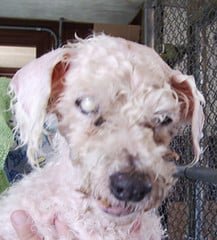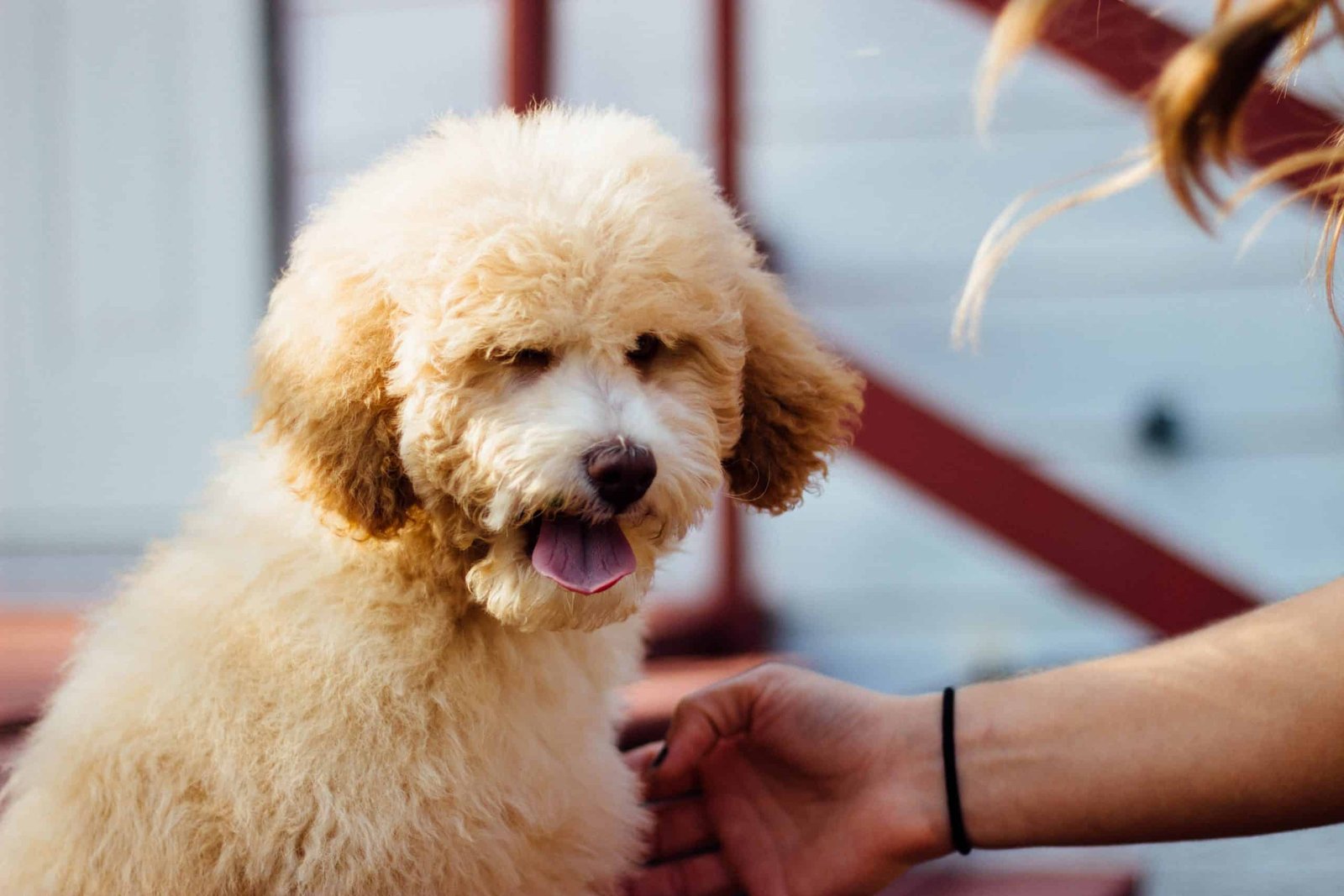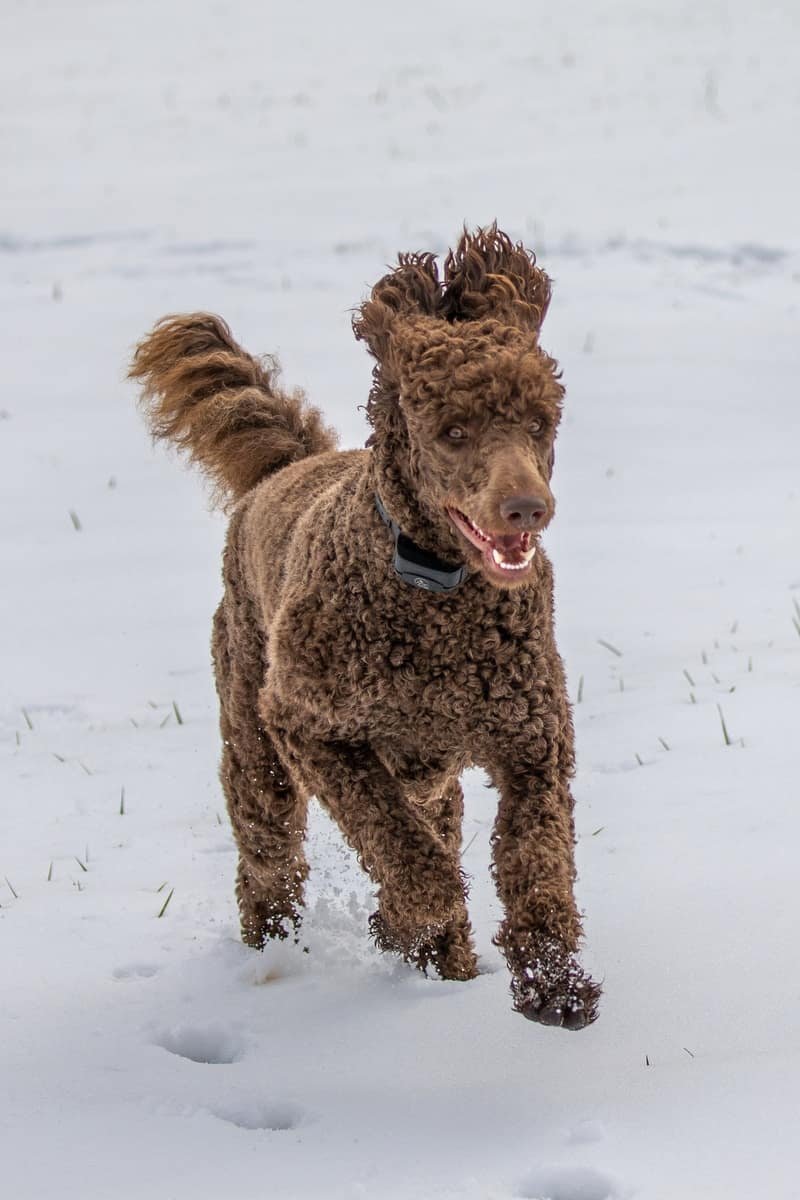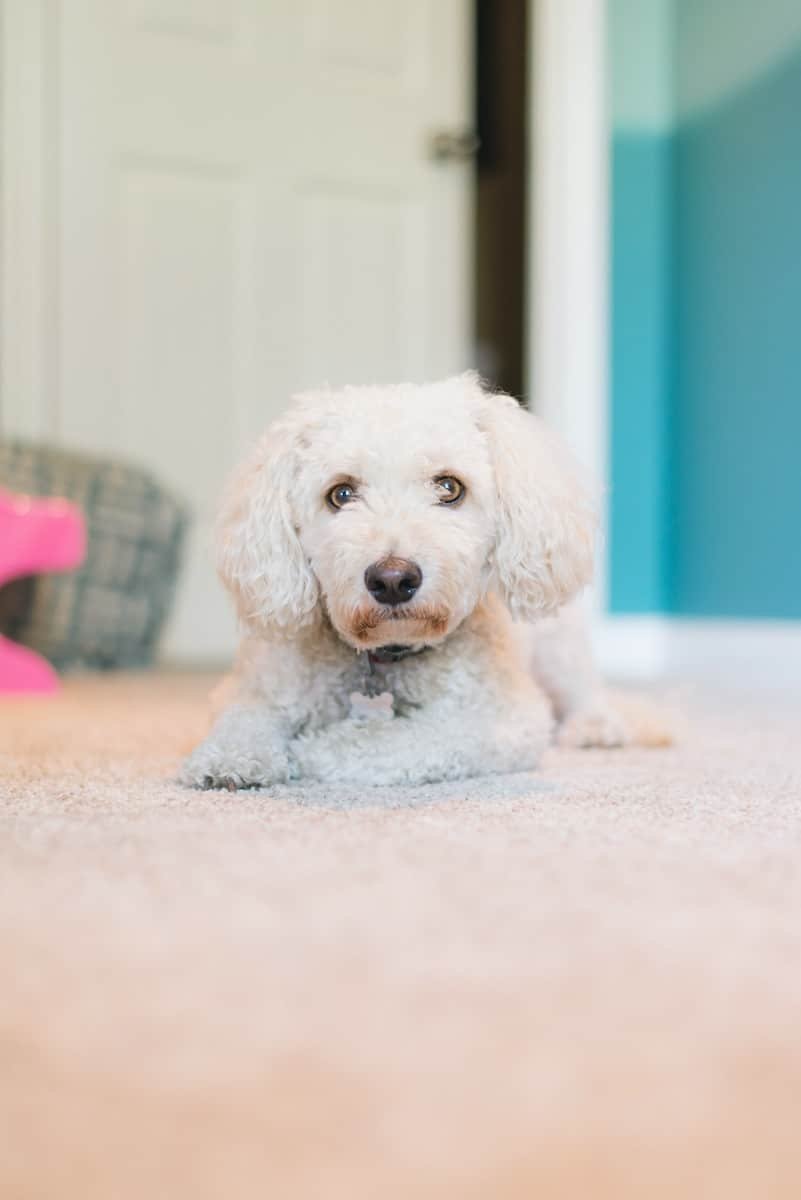
Bringing a new pet into your life is always an exciting experience, but when socializing a poodle who has been abused or neglected, the process can be tricky. While it may seem overwhelming at first, understanding how to socialize a poodle in this situation correctly is essential for providing them with the best care possible.
With patience, love, and care, you can provide your poodle with a much-needed sense of safety and security. So if you’re ready to start the journey of socializing with your newly adopted pup, let’s dive in and learn how!
First, it’s important to understand that your poodle may need more time and patience than a pup who’s not been through the trauma of abuse or neglect. It’s likely that your pet has become accustomed to fearing people, other animals, and even unfamiliar environments. When socializing them, be aware that they may be easily overwhelmed or frightened by new situations or people.
The best way to socialize your poodle is by introducing them slowly to new experiences. It’s important to understand that every pup is different, so you’ll need to tailor the process of socialization to fit your pet’s needs and personality.
Background of Neglected/Abused Poodle
Poodles that have been neglected or abused come from a variety of backgrounds and circumstances. Puppy mills, hoarding situations, and animal abuse can all lead to poodles living in environments where they did not receive proper socialization or care.
These dogs often lack the confidence needed to trust humans and may be fearful when exposed to new people, places, or things. Sometimes, animals may have lived their entire lives in an exercise pen with little human contact.
Medical issues could be present because of a lack of proper nutrition and veterinary care. It’s important for pet parents to look for signs of abuse or neglect when adopting an animal and to be prepared for behavior issues that may arise because of these experiences.
What is Socialization?
Socialization is a process that helps animals learn how to interact appropriately with humans and other animals. This includes exposing them to different environments, people, sounds, and experiences in order to build their confidence and trust.
For poodles that have been neglected or abused, it’s important to socialize the animal slowly and carefully. Setting up positive experiences such as playing with toys or going on car rides can help the animal learn that humans are not inherently bad.
It’s also important to be aware of body language and other warning signs of fear or aggression so that unwanted behaviors can be addressed quickly. Taking the dog to training classes or hiring an animal behaviorist can also help minimize unacceptable behaviors while also providing learning experiences for both pet parents and the poodle.
Assessing the Animal
Before beginning the socialization process, it’s important to assess the animal for any signs of abuse or neglect. Puppy mill dogs and other abused animals may have medical issues due to lack of proper care, so it’s best to contact a veterinarian to ensure the health of your pet before proceeding with training sessions.
It’s also important to look for signs of fear or aggression in the animal, which can be caused by a life spent in an exercise pen or being exposed to other forms of animal abuse. If these behaviors are present, it means that the poodle will require extra patience and love when being socialized.
Make sure that you give your dog plenty of exercise and playtime as this can help build stronger bonds between you and your pet while helping them learn friendly behavior towards humans and other animals.
Identifying Signs of Abuse or Neglect
It is important to be aware of the signs of abuse or neglect which can be present in a poodle that has been mistreated. Such signs may include fear or aggression towards humans or other animals, lack of proper care, and avoidance of direct eye contact.
Other common indicators include physical injuries, malnutrition, and lack of socialization with humans or other animals. Physical injury may appear as cuts, scrapes, bruises, broken bones or teeth.
Malnutrition will often result in a weakened immune system and illness, usually stemming from inadequate diet and nutrition. Lack of socialization can lead to shyness around people and unfamiliar environments, which can cause behavior problems, such as barking or aggressive tendencies when confronted with unfamiliar situations.
If any of these signs are observed in your pet poodle, it is important to seek professional help from an animal behaviorist right away in order to ensure their safety and well-being.
Conducting a Veterinary Exam
A veterinary exam is an essential step in socializing a poodle that has been abused or neglected. This exam should be conducted by a qualified veterinarian to ensure your pet is healthy and free from any medical issues that could affect their behavior.
The veterinarian should also perform a behavioral evaluation to assess the animal’s temperament, as well as any unwanted behaviors that need to be addressed. During this evaluation, it is important to observe the animal’s body language and behavior towards humans and other animals. If any signs of aggression or fear are observed, then it is essential to address them before progressing with socialization.
Once the vet has completed their examination, they can advise on how best to proceed with socializing your pet in order to help them adjust to a new home environment.
Determining Behavioral Issues
Determining behavioral issues in a poodle that has been abused or neglected can be challenging. It is important to observe the animal’s behavior towards humans and other animals, watch for signs of aggression or fear, and identify any unwanted behaviors.
Positive experiences with pet parents, such as providing treats and regular exercise, are essential for teaching good habits and helping the animal adjust to their new home environment. Puppy mill dogs often lack socialization since they lived in small cages their entire lives, so it is important to create a safe environment with an exercise pen or crate where they can get used to human contact.
If possible, enrolling your pet in training classes or sessions with an experienced animal behaviorist can help address specific behavior issues. Finally, remember that learning experiences take time; fearful animals may need additional patience while they learn to trust again through positive reinforcement and direct eye contact.
Establishing Trust and Safety
Establishing trust and safety with an abused or neglected poodle is an important part of the socialization process. One way to do this is to create a safe environment by using positive reinforcement techniques such as providing treats, regular exercise, and plenty of affection.
This will help the animal understand that they are in a safe place where they can relax and be comfortable. It is important to maintain direct eye contact when interacting with your pet; this will help them feel secure and show that you are trustworthy.
Try speaking in a calm voice and using body language to show friendliness, such as leaning over them while petting them gently or giving scratches behind the ears. Finally, if needed, consider enrolling in training classes or sessions with an experienced animal behaviorist for additional guidance on how to best interact with your pet.
Creating a Safe Space for the Poodle
Creating a safe space for an abused or neglected poodle is essential to their socialization process. Pet parents should create a space that is free from any potential danger, both physical and emotional. To do this, pet parents can invest in an exercise pen to provide a secure area for the animal with limited opportunities of escape.
This pen should be filled with plenty of toys and other resources that can help engage the animal during playtime. Pet parents should take the time to introduce the dog to new people and animals slowly and gradually; it’s important to monitor behavior carefully as some signs of abuse or neglect may not be immediately apparent.
It’s important that pet owners understand that puppies born in puppy mills may have spent their entire lives without human contact, so they will require extra patience and understanding as they learn how to live in a home environment. Finally, providing daily walks and plenty of attention will help socialize the poodle and make them feel more comfortable in their new surroundings.
Providing Comfort and Support
Providing comfort and support to an abused or neglected poodle is essential for their socialization process. Pet parents should be conscious of their own body language, using a soft and gentle tone when speaking to the animal. Any direct eye contact should be avoided as it could cause feelings of fear or anxiety for the animal. Pet owners should surround the dog with positive experiences and learning opportunities that enable them to form a trusting bond with their new family. This may include taking the time to introduce them to other animals in a safe and secure environment, enrolling in fun activities such as training classes or even simply providing them with plenty of toys and treats during playtime. Finally, if any unwanted behavior arises, it’s important to seek professional guidance from a qualified animal behaviorist who can provide further advice on how best to deal with any potential issues.
Building Relationships with Positive Experiences
Building relationships with an abused or neglected poodle can be an arduous process; however, providing positive experiences is key to their socialization. If a puppy mill dog has lived their entire life in a cage, it is important to introduce the outside world to them slowly. This may involve allowing them to explore their new environment in an exercise pen or on a leash and having plenty of treats available as rewards for good behavior. It is also important not to underestimate the power of human contact; gentle stroking and slow movements when interacting with the dog can help build trust and form positive associations. Enrolling in training sessions that focus on obedience and agility can provide learning experiences and help create strong bonds between pet parents and their pup. With persistence and patience, any fearful animal can eventually be taught how to love again.
Training Basics and Expectations
Training basics and expectations are a vital part of socializing an abused or neglected poodle. It is important to be patient and consistent when introducing the dog to socialization, as this will help them feel safe in their new home. Using treats as rewards for good behavior is a great way to encourage friendly behavior from your pup. For example, when teaching basic commands such as sit and stay, offer treats for successful completion of tasks. It is essential to be aware of the signs of abuse and any medical issues that may need to be addressed before beginning training. If you are unsure about how best to approach training your pup, it may be beneficial to consult with an animal behaviorist who can provide additional tips and guidance specific to your pet’s needs. With patience, consistency, and positive reinforcement, your pup will learn the skills necessary for successful socialization.
Implementing Basic Commands such as “Sit” and “Stay”
Implementing basic commands, such as “sit” and “stay” is an important part of socializing a poodle that has been abused or neglected. With patience and consistency, these commands can be introduced positively, making the learning process easier on your pup.
When introducing commands such as sit and stay, start by using treats as rewards for successful completion of tasks. This will ensure that your pup associates these commands with something positive. It is important to be consistent with the reward system; if your pup does not perform the command successfully, do not give them a treat but offer verbal praise or affection.
It is also essential to use clear body language during training sessions; when teaching, sit, point at the ground with your hand while saying “sit” firmly but in a calm voice. Finally, be aware of any signs of stress or fear from your pup during training sessions and take breaks accordingly to help reduce their anxiety levels. With patience and dedication, you can help your pup learn these basic commands quickly and effectively!
Introducing New Toys and Activities to Stimulate Exercise
Introducing new toys and activities to stimulate exercise pen time is a great way to help socialize a poodle that has been abused or neglected. Exercise pen time should be used as an opportunity for your pup to explore the world around them in a safe and controlled environment.
It’s important to introduce new toys and activities during this time, as it helps keep your pup engaged in their environment and prevents boredom. Consistency with rules, boundaries, and rewards system will help ensure that your pup understands what is expected of them during exercise pen time. This means that you should provide clear instructions before each activity and always enforce any rules you set in place.
Maintaining direct eye contact while interacting with your pup can help express respect and trust, which are essential when socializing an abused animal. With patience and positive reinforcement, you can help create a stimulating exercise pen experience for your pup!
Socializing Tips for Owners
Having an abused or neglected poodle is a challenge that many pet owners face. It is important to recognize signs of abuse or neglect, such as fear and aggression, and address them with patience and understanding. Socializing your poodle requires time, effort, and consistency. Start by introducing your pup to new people in a controlled environment, like a training session or class.
Also, be sure to provide plenty of positive reinforcement during this process. If your pup displays any unwanted behavior, remain calm and redirect their attention back to the task at hand. Finally, if you are having difficulty with your pup’s behavior issues due to lack of socialization or past abuse, consider consulting an animal behaviorist for help. With a bit of patience and understanding from their pet parents, abused or neglected poodles can learn how to interact with other animals and humans in a friendly manner!
Exposing Your Dog to Different Environments in Small Increments
Socializing an abused or neglected dog can be a difficult and trying to process. However, with patience and understanding, your pup can learn to trust humans and animals again. To socialize, expose your pup to different environments in small increments. This will help them become more comfortable with their surroundings without becoming overwhelmed.
Encourage interactions with other people and animals while remaining calm and providing positive reinforcement when needed. It is also important to pay attention to your pup’s body language as it can speak volumes during this process – if they seem fearful or uncomfortable, take a step back from the situation. If you encounter any issues during this process that you cannot handle on your own, seek professional help from an animal behaviorist or trainer for further guidance. With time and patience, your pup can learn how to interact with others in a safe and friendly manner!
Final Remarks on Socialization Processes for Abused/Neglected Poodles
When it comes to socializing an abused or neglected poodle, there are a few things that pet parents must keep in mind. It is important to remember that each dog is unique and will respond differently to the socialization process.
While some may take longer than others, providing patience, love and care throughout the entire process will be beneficial for your pup’s mental health. Learning experiences should also be enjoyed along the way – this can help foster an even stronger bond between you and your pup. If done correctly, socializing an abused or neglected poodle can be a rewarding experience for both of you!




